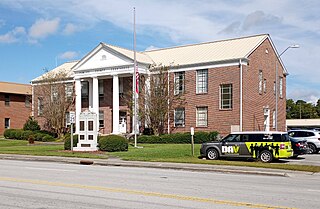Related Research Articles

PamlicoCounty is a county located in the U.S. state of North Carolina. As of the 2020 census, the population was 12,276. Its county seat is Bayboro.
More than 1,500 African American officeholders served during the Reconstruction era (1865–1877) and in the years after Reconstruction before white supremacy, disenfranchisement, and the Democratic Party fully reasserted control in Southern states. Historian Canter Brown Jr. noted that in some states, such as Florida, the highest number of African Americans were elected or appointed to offices after the end of Reconstruction in 1877. The following is a partial list of notable African American officeholders from the end of the Civil War until before 1900. Dates listed are the year that a term states or the range of years served if multiple terms.

Thomas Bothwell Jeter was the 79th Governor of South Carolina from September 1, 1880 to November 30, 1880. His home in Union, South Carolina is listed on the National Register of Historic Places.

Stephen Decatur Lindsey was an American attorney and politician from Maine. A Republican, he served terms in the Maine House of Representatives and Maine Senate. In 1876, he was elected to the United States House of Representatives. He was reelected in 1878 and served from 1877 to 1883.

David Moffatt Furches was an American politician and jurist who served as an associate justice (1895–1901) and chief justice (1901–1903) of the North Carolina Supreme Court.
Armistead Burwell was a teacher, Confederate soldier, lawyer, state senator, and associate justice of the North Carolina Supreme Court.

The Carolina Watchman was an American weekly newspaper published in Salisbury, North Carolina, from 1832 to 1937. It variously supported the Whig, Democratic, and Populist parties, as well as the Confederacy during the Civil War. For a few years, it was mostly politically independent and known as the Watchman & Old North State.
William R. Jervey was a member of the South Carolina House of Representatives during the Reconstruction era, and then a state senator.

Joseph Murphy Gazzam was an American lawyer, politician, and businessman.
Max Warley Platzek was a Jewish-American lawyer and judge.
George Allen Mebane was a state legislator in North Carolina. He lived in Windsor. He was African American. He served in the North Carolina Senate during the 1876–1877 session representing Bertie County and Northampton County.
Robert Simmons was a farmer and state legislator who served in the South Carolina State Senate from 1882 until 1886.
Richard Tucker was a carpenter, undertaker, and state legislator in North Carolina. He represented Craven County in the North Carolina House of Representatives in 1870 and in the North Carolina Senate in 1874 during the Reconstruction era.
Hanson Truman Hughes was an American politician and state legislator in North Carolina. He represented Granville County, North Carolina in the North Carolina House of Representatives in 1876. He was one of five African Americans serving in the North Carolina Senate in 1876 to 1877. He also worked as a barber.
Marmaduke Swaim Robins was a teacher, lawyer, politician and newspaperman in North Carolina. He served as private secretary to North Carolina governor Zebulon Vance and as a state legislator.
Garland Sevier Ferguson Sr. was a farmer, soldier, clerk, lawyer, state senator, and judge in North Carolina. His son Garland S. Ferguson Jr. also became a public official.
William Patrick Mabson, Sr., was an American educator, minister, newspaper owner, editor, and politician. He was a state legislator in North Carolina for at least two terms, active during the Reconstruction era. Mabson was one of the founders of Freedom Hill, Edgecombe County, North Carolina.
John R. Bryant was an American political leader in North Carolina. He was elected to represent Halifax County in the North Carolina House of Representatives in 1870 and 1872. He served in the North Carolina Senate during the 1874 and 1876–1877 terms. He was one of five African Americans serving during that term. They were Hanson T. Hughes, George A. Mebane, William H. Moore, and William P. Mabson.
George M. Rose was Speaker of the North Carolina House of Representatives. He was a Democrat.
William H. Moore was a state legislator in North Carolina. He served in the North Carolina House of Representatives during the Reconstruction era. He represented New Hanover County and served with other African Americans in the state legislature. His post office was in Wilmington, North Carolina. He served with Henry Brewington and Alfred Lloyd who also represented New Hanover in the 1874-1875 session. All three were African Americans.
References
- ↑ Court, North Carolina Supreme (December 29, 1878). "North Carolina Reports: Cases Argued and Determined in the Supreme Court of North Carolina". Nichols & Gorman, book and job printers – via Google Books.
- ↑ Hogan, Cleo G.; Hogan, Charles Edward (December 29, 1998). "Hogan Genealogy: The Descendants of Colonel John Hogan and Mary Lloyd Hogan of Orange County, NC and Montgomery County, TN". C.G. Hogan and C.E. Hogan – via Google Books.
- ↑ Senate, North Carolina General Assembly (December 29, 1883). "Journal" – via Google Books.
- ↑ "North Carolina State Senate - 1876-1877". www.carolana.com.
- ↑ "North Carolina in the American Civil War - Capt. William R. Bass's Company (Infantry)". www.carolana.com.
- ↑ "SR_State_Auditor_1901_Pensions_5_22_64_38_Caho_William_T_Beaufort_County_004". digital.ncdcr.gov.
- ↑ "Pamlico County NC Gazetteer: 1883-84". www.ncroots.com.
- ↑ https://www.worldcat.org/title/163575379
- ↑ Son, N. W. Ayer & (December 29, 1902). "N. W. Ayer & Son's American Newspaper Annual: containing a Catalogue of American Newspapers, a List of All Newspapers of the United States and Canada, 1902, Volume 2". UNT Digital Library.
- ↑ "1893 Business Directory, Pt 2". newbern.cpclib.org.
- ↑ "Caho v. Norfolk & Southern Railway Co., 147 N.C. 20 (1908) | Caselaw Access Project". cite.case.law.